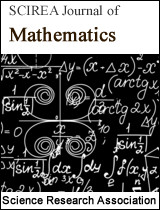Mathematics Model of Malaria Life Cycle
DOI: 340 Downloads 18400 Views
Author(s)
Abstract
On April 12, 2018 Dr. Ana-Maria Croica gave a presentation as NSF-Target Infusion Program Seminar Series. Her topic is “An Optimal Control Model to Reduce and Eradicate Anthrax Disease in Herbivorous Animals. This research is based on Saad-Roy’s Mathematical Model of Anthrax Transmission in Animal Population. I was impressed by her mathematical model. Therefore, I would like to apply her process to construct a mathematical model for the Malaria lifecycle. Malaria lifecycle includes two major parts: Human host and Infected Mosquitos. At this research we first created two sub-models: Human Host Sub-Model and Mosquitos Sub-model. The combined these two sub-models into one Malaria Lifecycle model. We also considered the seasonal effect on mosquito’s birth and the effects by immunization and quarantine human host of malaria.
Keywords
Life Cycle, Malaria, SIR model, Vensim
Cite this paper
Shinemin Lin, Lewis Hall,
Mathematics Model of Malaria Life Cycle
, SCIREA Journal of Mathematics.
Volume 4, Issue 2, April 2019 | PP. 37-49.
References
| [ 1 ] | Malaria, CDC, https://www.cdc.gov/parasites/malaria/index.html |
| [ 2 ] | Shiflet and Shiflet, Introduction to Computational Science, Modeling and Simulation for The Science. 2nd Edition, Princeton University Press, 2006 |
| [ 3 ] | Murray, Mathematical Biology, 2nd Edition, Springer, 1993 |
| [ 4 ] | Pannof, Bob, Workshop Notes at West Virginia State University, August 1 – 3, 2016 |
| [ 5 ] | Zill Wright, “Differential Equations with Boundary-Valued Problems”, 8th Edition, 2013 |
| [ 6 ] | Jack Andenoro, “The Spread of Infectious Disease”, http://home2.fvcc.edu/~dhicketh/DiffEqns/ Spring2012Projects/M274FinalProjectJackAndenoro/RuftDraft.pdf, May 11, 2012 |
| [ 7 ] | Lin, S., (2018) Spread a Disease. SIMINODE.org. https://www.simiode.org/resources/4947 |
| [ 8 ] | Thomas, D., Lin, S., (2017). Everyone can do Differential Equations. International Journal for Innovation Education and Research, 5 (4), 121 - 132 |
| [ 9 ] | Lin, S., D. T. (2017). Inquiry-Based Science and Mathematics Using Dynamic Modeling. SCIREA Journal of Mathematics, 2 (2) 24 - 48 |

